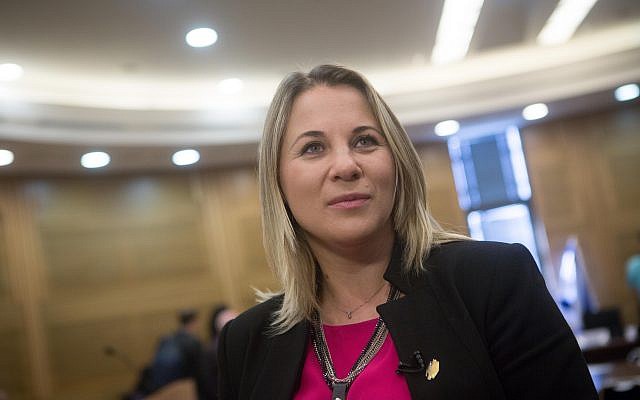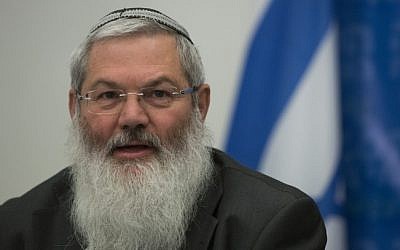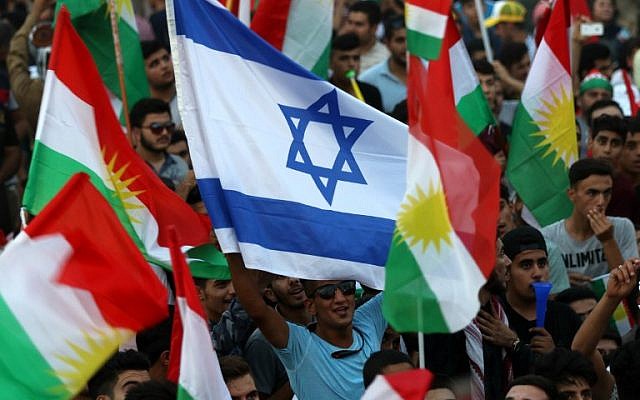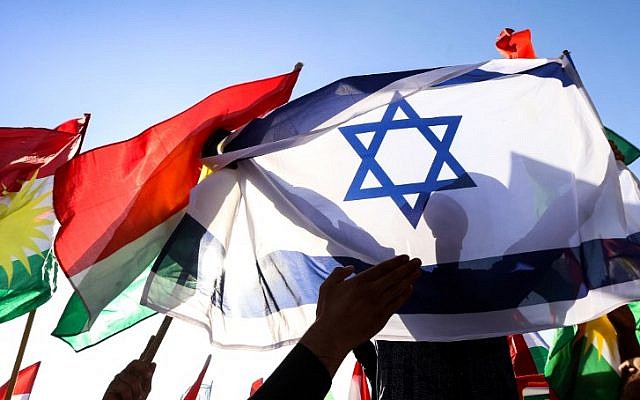timesofisrael.com
As MKs line up to declare support for Kurdistan, one lawmaker seeks to facilitate contact between Kurds and Israelis
Dov Lieber is The Times of Israel’s Arab affairs correspondent.
A bill introduced in the Knesset and set to be brought to a vote in the coming weeks would see all areas controlled by Kurdish people in the Middle East excluded from the laws prohibiting Israelis from traveling and doing business in enemy states.
MK (Zionist Union) Ksenia Svetlova announced her bill on Wednesday during a rare Knesset conference about relations between Israel and the Kurdish people.
The purpose of the bill, she said, was to ease access to Kurdish-controlled territory for “Israelis who want to be there for academic or commercial purposes, or visiting graves of their loved ones.”
Tens of thousands of Jewish families were forced to immigrate to Israel from Iraq soon after the birth of the State of Israel in 1948. Today, there are almost 200,000 Kurdish Jews in Israel, about half of whom reside in Jerusalem.

The bill, a copy of which was given to The Times of Israel, makes no explicit distinction between Kurdish-controlled areas in Iraq — known as the Kurdish Regional Government (KRG), where Israelis can travel fairly safely — and other Kurdish areas, whether in northern Syria or in Iran.
The vagueness is intentional, the bill’s author told The Times of Israel. The legislation is currently meant to refer just to Iraqi Kurdistan, though that could change in the future.
Svetlova, who serves as the head of the Knesset pro-Kurdish caucus, gave a cautious estimate of its chances of being signed into law.
“I’m not saying one hundred percent it will not pass,” she said, adding that she knew many government ministers are “sympathetic” to her initiative.
“But even if it will not pass this time, it will help us put on the table a very important definition: What is Iraqi Kurdistan? Can we continue to treat it just like [the rest] of Iraq?” she said.
Svetlova added: “It’s important for Israeli citizens who are interested in pursuing ties with the Kurds to know that when they come back from Kurdistan they won’t be persecuted by a variety of security agencies, and this is unfortunately what happens now.”
‘We’re happy to be a second Israel’
Wednesday’s conference on Kurdish-Israeli relations was attended by lawmakers from both the ruling coalition and the opposition who expressed deep support for the Kurdish people and their right to self-determination.
The conference was also attended by pro-Kurdish activists from Israel, Europe and Iraq.
In September a majority of voters in the KRG supported independence in a referendum, but opposition from Baghdad and every state in the region but Israel stymied the Kurdish hopes of establishing their own state in northern Iraq for the time being.
Prime Minister Benjamin Netanyahu reportedly lobbied world leaders to support the Kurdish referendum.
Deputy Defense Minister Eli Ben-Dahan echoed a sentiment common among lawmakers at the conference, saying that though Israel has “limitations” in terms of what it can do for the Kurds due to regional politics, “Israeli civil society can give a lot to the Kurdish population.
“There is a huge gap on almost everything” between the opposition and the coalition, said former minister Tzipi Livni, “but when it comes to the Kurdish people, we all feel the same.”
Ben-Dahan chimed in, “I agree.”

Likud MK Nurit Koren said, “We must do everything we can to help our brothers in Iraqi Kurdistan.”
Svetlova suggested Israel supply the Kurds with agricultural technology that would help wean them off their crucial economic support from Turkey, which opposes Kurdish independence.
Deputy Minister for Diplomacy Michael Oren called it a “tremendous injustice” that the Kurds, whom he called a “moderate Muslim, pro-Western people deeply deserving of freedom,” do not receive the same amount of international support for an independent state as the Palestinian people, despite being vastly more numerous.

There are around four to five million Palestinians living between Gaza and the West Bank, while the Kurds are estimated to number around 35 million between Turkey, Syrian, Iraq and Iran.
Iraqi Kurds have publicly expressed their thanks for Israel’s support by waving the Jewish state’s flag at independence rallies, prompting Iraq’s parliament to criminalize it.
Some opponents of the Kurdish referendum, including Turkish and Iranian leaders, have claimed it was just an Israeli scheme to divide Arab states.
Kahraman Evsen, president of the Kurdish European Society and one of the speakers at the Knesset event on Wednesday night, said he didn’t mind criticism over Kurds’ ties to Israel.
“It’s a common idea for the people in Kurdistan to say, okay, you reproach us for being a second Israel, but that is exactly what we want, because Israel is a democracy, Israel is a country that is based on the rule of law that protects minorities, is inclusive and has diversity,” he said. “If people are criticizing us for being a second Israel, then we are happy.”






